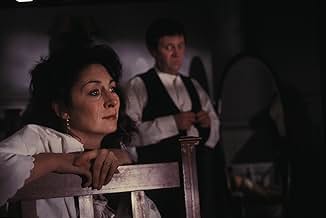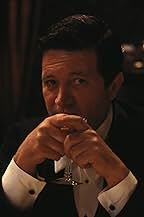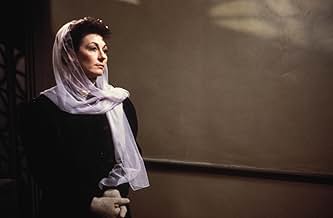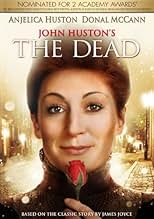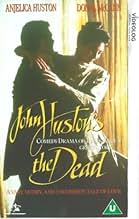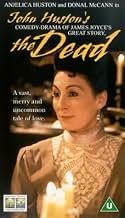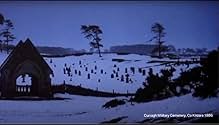Gabriel Conroy e sua moglie Gretta partecipano ad una cena con amici a casa della loro zia, una serata che risulta in un'epifania per entrambi.Gabriel Conroy e sua moglie Gretta partecipano ad una cena con amici a casa della loro zia, una serata che risulta in un'epifania per entrambi.Gabriel Conroy e sua moglie Gretta partecipano ad una cena con amici a casa della loro zia, una serata che risulta in un'epifania per entrambi.
- Candidato a 2 Oscar
- 10 vittorie e 18 candidature totali
- Miss Furlong
- (as Katherine O'Toole)
- Mr. Grace
- (as Seán McClory)
Recensioni in evidenza
University professor Gabriel Conroy (McCann) and his wife Gretta (Houston) are invited to attend the annual dance and dinner to celebrate the Feast of the Epiphany, hosted by the former's aunties, the Morkan sisters, Kate (Carroll) and her elder sibling Julia (Delany), as well as their niece Mary Jane (Craigie). Other guests are also presented, among which there is Mr. Grace (McClory, the Irish old stager in his final silver screen presence), a character doesn't exist in Royce's original text, entertains audience with his sublime recitation of a Middle Irish poem YOUNG DONAL, " ..You have taken the east from me; you have taken the west from me; you have taken what is before me and what is behind me; you have taken the moon, you have taken the sun from me; and my fear is great that you have taken God from me.", it is a magic moment where the sheer power of words embraces its deserved cinematic glory.
Another highlights include Freddy Malins (Donnelly, an unforeseen usurper in my BEST SUPPORTING ACTOR list), a middle-aged bachelor, a raging alcoholic, Gabriel's childhood friend, noticeably under the influence, his soused conduct sterlingly breathes an air of discomfiture and drollness on top of the cordiality presented by the rest of the ensemble; whereas his mother Ms. Malins (Kean), a helicopter parent who perhaps isn't even aware of what damage she has done, and risibly puzzles why her son keeps being such a disappointment and laughing stock.
Irish hospitality, as Gabriel addresses in his heart-felt tribute speech to the three hostesses, whom he praises as "three Graces", is the glue brings everybody altogether, regardless of their tastes in music, political stances or even religious persuasions. Cathleen Delany as Aunt Julia, upstages the rest of the Irish ensemble with her grand reaction shots and bolstered by her rendition of an Irish folk song, purely because it is too rare a case that the script would give sizable screen time to a senior lady singing in her weather-beaten timbre (apart from Ms. Florence Foster Jenkins for obvious reason).
Anjelica Houston, shares her last journey of movie-making with her esteemed father, takes a back seat in the dinner party with her composed demeanor, until Gretta's concealed memory is unexpectedly prompted by THE LASS OF AUGHRIM sung by the tenor Bartell D'Arcy (Patterson), when the party is winding down. In her quietly poignant confession of a deceased young man who she fell in love with, the film reaches its well-earned catharsis through Donal McCann's reflective voice-over about certain existential epiphany, enhanced by the picturesque montage from DP Fred Murphy and Alex North's conspicuously pensive accompanying score.
John Houston takes his exit with an elegiac meditation in honoring his forefathers and passing on his wisdom to his devout audience, it is brimming with loftiness, sincerity and an utterly captivating sensibility, and we wish the party would never be over, because goodbye is the hardest word to say to a beloved master.
At dinner, tenor Frank Patterson sings for the guests, his lovely voice stealing through the walls like the scent of a garden into a tomb. Beauty like this makes us want to find someone, open our jugular vein, and urgently bleed into them. We feel that somewhere burns an unseen, silent, and impossibly distant Light. If only we could share that Light with someone, or at least share a quest for it. But how? Alas, we can only stand at the bedroom window alone, watching the snowfall like Anjelica Huston's husband (Donal McCann) does at the movie's end. Many characters in the movie spend their whole lives at that bedroom window. Others are like Michael Fury, dying in a freezing river as he stares at the house where his Beloved conducts her affairs, unresponsive to him. At one point, after a guest recites a moving poem, one of the female guests laments, "Imagine being loved like that." She means a devotion so intense as to rearrange our psyches. But her chance for love is gone, crushed beneath layers of dashed hopes now piled high like the snows of Ireland in the movie. No rose sprouts in these drifts; only long-buried yearnings that waft like a vapor around headstones.
This movie hints at secrets that are akin to something one experiences as a child who, lying awake and alone one night, spies a star outside the window and for an instant glimpses the Unspeakable. The child makes no mention of this to anyone - who would understand? ("That's nice, dear.") But the longing to share that glimpse with someone, or to share someone else's glimpse, burns until death. At the end of "The Dead," Anjelica Huston's husband realizes that he has shared no such glimpse with his wife, no such love. His wife has sobbed herself to sleep on the bed and remains silent as he looks out the bedroom window in the wee hours. Great stories have great dialogue, but the greatest have characters whose silence points to the realm of boundless could-be's. We hear the husband's lamenting thoughts as exterior night scenes melt into one another. Fields, starlit graveyards, wizened trees -- all hushed as "snow is gently falling all over Ireland, and falling gently."
No routine tale of collision between desire and proscription this; no melodramatic costume-struggle between attraction and social propriety. "The Dead" speaks to each person's Star of Bethlehem, glimpsed once and then repressed until something like this dinner party shakes it loose. On the morrow the guests will tell themselves that they simply had too much wine at the party, and will thereby seal Heaven into their mental cellar once more. Their pain will continue as always.
Sensitive and understated, I give this one top marks across the board. Bravo to John Huston. A fitting last effort by a great director.
The story captured a time, a place, and a romanticism that I've dreamt about all my life. The setting is a house at the turn of the century, filled with guests from all over Ireland, who gather for an evening of dancing, poetry and piano recitals.
Joyce's consummate story telling, is not found in the almost mechanical way most authors put their stories together, but it's revealed in the sheer power and strength of feeling projected by the characters involved; Gabriel's concern about his after dinner speech and the ongoing changes in Ireland, Gretta's secret passion for someone she'd once loved and lost, and now even the mere acknowledgment of such a love threatens to destabilize her relationship with Gabriel, Freddie's inability to rise beyond his drug dependency, the arrogant tenor Mr D'Arcy at the table loudly trying to upgrade his status through his supposed musical superiority, Lilly the housemaid all nervousness and efficiency, the list goes on: each playing their part with absolutely convincing character motivation.
How could John Huston's film ever really of taken on such a literary masterpiece and still proved faithful? Well, to his credit, he comes pretty close.
Of course when we're reading a story, an author often leaves a degree of ambiguity, specific areas in which we're allowed to interpret our own mental pictures from the words cited. Joyce was no different. Here lies the problem: transfering a work of fiction to celluloid is like trying to join up the dots. Not everyone is going to recognize the picture and be happy with the adaptation.
Personally, I loved the film. However, there were a couple of scenes that I knew were going to prove a problem, and they did prove problematic. Firstly, when Gretta defers her descent down the stairs after dinner, because she's filled with thought's of Michael Furey and the love that she'd lost. The memories come flooding back. She can hear his voice superimposed over D'arcy's and it unsettles her. It's such a deep enduring moment. In the film, Huston just looks away dreamily. There's very little to express the full range of thoughts rushing through her head. It's not Angelica Huston's fault. It simply highlights how difficult it is to accommodate the limitless expression of literature to the silver screen, which is why like an earlier commentator on this film asserted, I too strongly recommend that Joyce's story is read first. It really does add a great deal.
The second scene that troubled me was the ending. It doesn't even begin to pack the tremendous power of Joyce's written word. How could it? This is a stream of subconscious thought extracted from the greatest short story in the English language reduced to a simple voice-over.
Ah, well! Still a good film. Overall Rating: 8 out of ten.
Lo sapevi?
- QuizThe character Mr. Grace does not appear in James Joyce's original story. He is an invention of John Huston and Tony Huston's, and was chiefly included so as to permit a reading of the eighth-century Irish poem Donal Og ("Young Donal"). Although it represents a departure from Joyce's text, the poem is nonetheless appropriate to the story's themes: like the song "The Lass of Aughrim" that follows it, "Donal Og" deals with the suffering that love can bring to young women...just as it has for Greta.
- BlooperMolly says she is off to a union meeting in Liberty Hall to hear James Connolly speak. The movie is set on January 6, 1904. However, James Connolly had emigrated to the USA in 1903, where he arrived on September 18, 1903. He did not return to Ireland before 1910. He arrived in Derry on July 26, 1910.
- Citazioni
[last lines]
Gabriel Conroy: [voice over] One by one, we're all becoming shades. Better to pass boldly into that other world, in the full glory of some passion, than fade and wither dismally with age. How long you locked away in your heart the image of your lover's eyes when he told you that he did not wish to live. I've never felt that way myself towards any woman, but I know that such a feeling must be love. Think of all those who ever were, back to the start of time. And me, transient as they, flickering out as well into their grey world. Like everything around me, this solid world itself which they reared and lived in, is dwindling and dissolving. Snow is falling. Falling in that lonely churchyard where Michael Furey lies buried. Falling faintly through the universe and faintly falling, like the descent of their last end, upon all the living, and the dead.
- Versioni alternativeTen minutes of the film have been omitted from the 2009 DVD release.
- ConnessioniFeatured in John Huston and the Dubliners (1987)
I più visti
- How long is The Dead?Powered by Alexa
Dettagli
- Data di uscita
- Paesi di origine
- Lingue
- Celebre anche come
- The Dead
- Luoghi delle riprese
- Aziende produttrici
- Vedi altri crediti dell’azienda su IMDbPro
Botteghino
- Lordo Stati Uniti e Canada
- 4.370.078 USD
- Fine settimana di apertura Stati Uniti e Canada
- 69.074 USD
- 20 dic 1987
- Lordo in tutto il mondo
- 4.370.078 USD
Contribuisci a questa pagina



